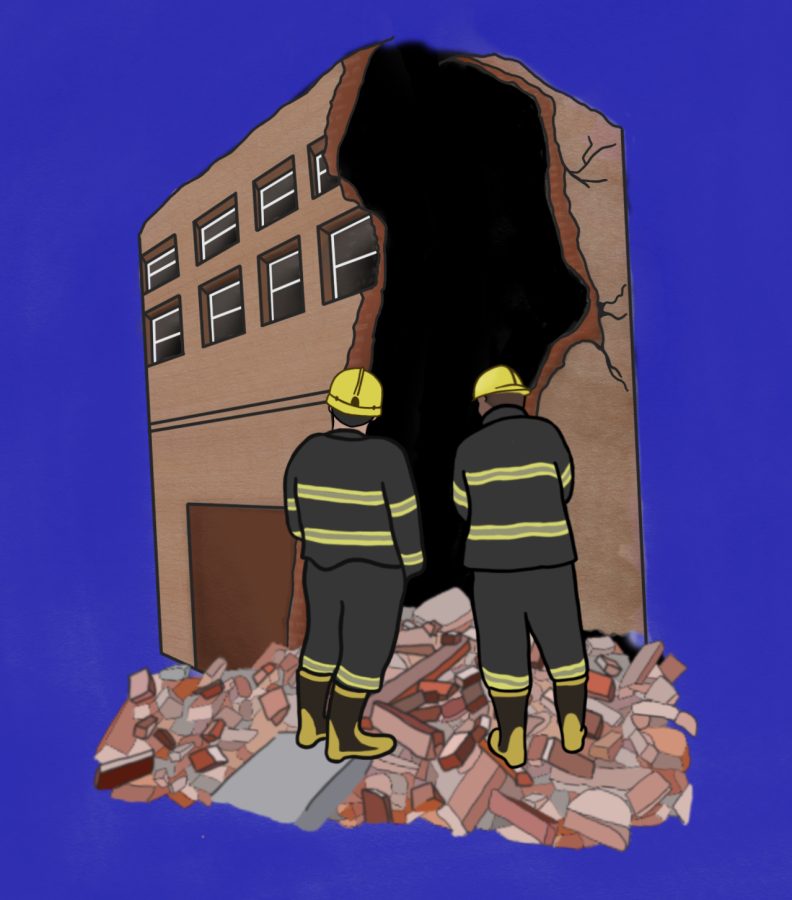OPINION: Turkey’s faults
Turkey-Syria earthquake shows the truth
April 18, 2023
Nobody expects the worst to happen, until it actually happens: the tormenting nightmare of having your family become a statistic and your house an aftermath photo. The 7.8 magnitude earthquake that occurred on Feb. 6 that demolished cities in Turkey. People there didn’t expect what would happen next: the Turkish government failed when they needed it most.
Although my family wasn’t directly affected by the recent earthquakes, my own worry doesn’t go away. My entire extended family lives in Istanbul which sits on the North Anatolian fault line. The constant fret of when disaster might strike is like a looming cloud over all of us. With another 6.4 magnitude earthquake hitting the faultline, my friend’s families are being evacuated and forced out of their homes, their future uncertain.
Despite all the warnings that the infrastructure was unstable, the worst did in fact happen, at 4 a.m. Feb. 6, an earthquake hit the southeast region of Turkey bordering Syria, affecting major cities. However, the blame for the damage shouldn’t be on the earthquake but on the government.
In 1999, a similar earthquake — a 7.4 magnitude— hit Turkey, according to The Guardian. After the death of over 17,000 people, the government of Turkey promised stricter building regulations to ensure sturdier infrastructure and introducing an “earthquake tax,” which would increase the country’s preparedness. Now two decades later, after the devastating effects of the most recent earthquake, it’s clear that it was all empty promises. In 2017, the Istanbul office of the Union of Architects and Engineers of Turkey said seven million buildings in the country were unsafe, two million of them in Istanbul.
NPR states the “earthquake tax” was in fact funded — over $4.5 billion USD. But the money is nowhere to be found, instead it’s suspected that politicians are using it to fuel their own political agenda.
“Everybody knows that the money isn’t actually being used for a good cause but what can we do about it? It’s the government,” Ela Aydin, a Turkish citizen, said.
Even with all the incompetence from the government, countries around the globe have dedicated their time and resources, deploying relief aid. This is an explicit reflection on how countries such as Greece and Armenia, countries that Turkey has conflicted with over decades, pushed aside political tension to help Turkey.
“It’s not about politics, it’s about humanity. I’m sure that Turkey would also be one of the first countries to help them in case of an emergency,” said Abdullah Coskun, vice president of Stanford’s Turkish Student Association.
People are still being rescued by humanitarian aids and relief support after 250 hours underneath the rubble, the Turkish government is focusing on detaining “the culprits” – construction companies. Over 100 were detained by a new “Earthquake Crimes Investigation” unit which was established in response to this disaster, according to Wall Street Journal.
Whether these detained building contractors are guilty or not, the responsibility of assuring the public’s safety should always be the government’s. The World Health Organization reported that almost 26 million people have been personally affected by the earthquake and instead of focusing on those, politicians are protecting themselves by refusing to acknowledge their negligence.
This result is linked to a long- line of corruption that runs deep in the Turkish government and finally after this earthquake, change needs to be implemented. The government needs to do better. Not only for its own political future, but also for its people.
There is often guilt linked with leaving your home country, like how my parents felt, and it weighs heavily especially when a disaster strikes. Although it’s frustrating trying to support your family by fundraising instead of being there, it’s all we can do from across the Atlantic Ocean.
“Of course I feel hopeless, but we’ve fundraised over $100,000 so even though it’s a tiny drop in the ocean, it helps,” President of Stanford’s Turkish Student Association, Baris Baran Gundogdu said.
As a Turkish citizen, I am appalled by the sheer incompetence of these politicians. I know how beautiful my country is, the tenacity we have, and for the government to be destroying it is heartbreaking. In Turkish we say ‘daha iyisini yap’ which translates to “do better” so on behalf of my aunts, uncles, cousins and the rest of Turkey eagerly watching the news hoping that the death toll doesn’t increase, please do better.
In accordance with the Stanford Turkish Student Association, please support the Bridge to Turkiye relief fund, any donations would be helpful. All proceeds go directly to those impacted. https://secure.givelively.org/donate/bridge-to-turkiye/kahramanmaras-earthquake-relief-fund/baris-baran-gundogdu

